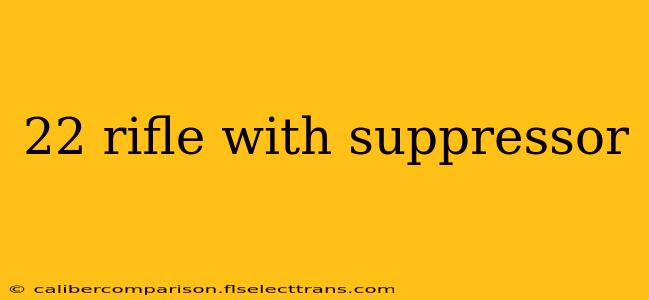The .22 LR caliber is a favorite among shooters for its affordability, low recoil, and versatility. Adding a suppressor takes this popular round to another level, significantly reducing noise and recoil. This guide will explore the benefits, considerations, and legality of using a .22 rifle with a suppressor.
Why Choose a .22 Rifle with a Suppressor?
The advantages of pairing a .22 rifle with a suppressor are numerous, appealing to both casual shooters and serious enthusiasts.
Noise Reduction:
This is the most obvious benefit. Suppressors drastically reduce the sound of a gunshot, making shooting more enjoyable and safer for both the shooter and those nearby. This is especially beneficial for plinking, training, and hunting in noise-sensitive areas.
Recoil Mitigation:
While .22 LR recoil is already minimal, a suppressor further reduces it. This makes the rifle easier to handle, especially for new shooters or those with physical limitations. Improved control leads to better accuracy and faster follow-up shots.
Improved Accuracy:
The reduced recoil and muzzle jump contribute to enhanced accuracy. Subtle shifts in aim caused by recoil are minimized, allowing for tighter shot groups.
Enhanced Hearing Protection:
Even with hearing protection, the repeated exposure to loud gunfire can take a toll. A suppressor significantly lowers noise levels, protecting your hearing over time.
Types of .22 Suppressors:
Suppressors are available in various designs, materials, and sizes. The best choice depends on individual needs and preferences.
Integral Suppressors:
These are built directly into the barrel of the rifle. They offer a clean, integrated look but are typically less versatile and harder to clean.
Detachable Suppressors:
These can be easily attached and removed from the rifle's muzzle. They are more versatile, allowing you to use the rifle with or without the suppressor. Detachable suppressors are the most popular choice among .22 rifle owners.
Legal Considerations:
The legality of owning and using a suppressor varies significantly depending on your location. Federal and state regulations must be thoroughly researched before purchasing or using a suppressor. This includes understanding registration requirements and potential licensing fees. It’s crucial to comply with all applicable laws and regulations.
Choosing the Right .22 Rifle and Suppressor:
Selecting the right combination depends on the intended use. Consider the following factors:
- Rifle Type: Bolt-action, semi-automatic, or pistol-caliber carbines all offer different advantages.
- Suppressor Design: Choose a suppressor designed specifically for .22 LR. Some suppressors are optimized for specific rifle types or subsonic ammunition.
- Materials: Stainless steel, titanium, and aluminum are common materials. Each offers a balance of durability, weight, and cost.
Maintenance and Cleaning:
Regular cleaning and maintenance are crucial for maintaining the performance and longevity of your suppressor. Follow the manufacturer's instructions carefully. Failure to properly maintain a suppressor can affect performance and potentially damage the unit.
Conclusion:
Adding a suppressor to your .22 rifle can significantly enhance the shooting experience. However, it's essential to understand the benefits, legal requirements, and maintenance considerations before making a purchase. Careful research and responsible gun ownership are paramount. Remember to always check local and federal regulations regarding suppressor ownership and use.

